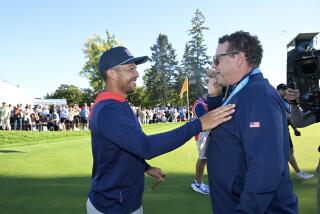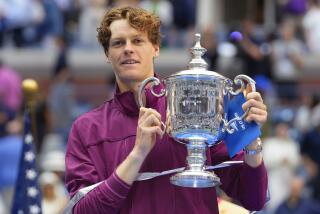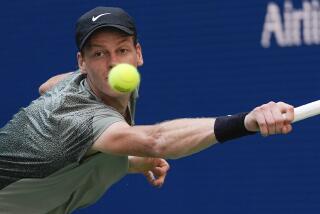U.S. Open Tennis Championships : No. 115-Ranked Haarhuis Ousts McEnroe; Becker Survives in 5 Sets
- Share via
NEW YORK — Paul Haarhuis, ranked 115th and forced to win three matches merely to qualify for his first U.S. Open, sent four-time champion and fourth-seeded John McEnroe out in the second round Wednesday night in a 6-4, 4-6, 6-3, 7-5 shocker.
Haarhuis’ victory capped a day of splendid tennis at the Open as three-time Wimbledon champion Boris Becker struggled to survive a five-set match and top-seeded Ivan Lendl won his first match.
“It’s one thing if the guy plays really well,” said an annoyed McEnroe. “It’s harder to take if I play as poorly as I did. This is a tough one to take.”
McEnroe, who lost in the semifinals at Wimbledon and hoped to crown a year of hard work by coming back to full strength at the Open, was plainly disgusted with himself.
“I worked to get to No. 4 in the world, then to lose to a guy I hadn’t seen play before is pretty bad,” he said. “I expected more from myself.”
Haarhuis, 22, who is ranked third in the Netherlands and didn’t even qualify for his country’s Davis Cup team, was elated to be playing here at all, much less to beat McEnroe on his home turf.
Haarhuis never attempted to qualify in a Grand Slam event prior to qualifying for the 1989 French Open, where he reached the third round. He attended Armstrong State College from 1984 to 1986 before transferring to Florida State for two years.
“I was loose. There was no pressure on me to win,” Haarhuis said. “All I had to do was go out and play good tennis. And it’s a great feeling to beat a great player like John McEnroe.”
Becker, fighting his private curse at the Open, went to the edge against the Californian in the second round and barely survived.
Becker lost the first two sets to Derrick Rostagno and saved two match points in the fourth-set tiebreaker before clawing back to win, 1-6, 6-7, 6-3, 7-6, 6-3, in a 4 1/2-hour marathon filled with spectacular points.
Lendl, who chased his own demons at the Open in his early years but overcame them to win it three times and reach the finals four more, struggled a little before beating Diego Perez, 6-1, 7-6, 6-4, in a first-round match suspended by rain Tuesday night.
The lights bothered Lendl when he started the match and the jets from LaGuardia Airport bothered him when it resumed.
“I can’t hear the ball,” Lendl said. “Put earplugs in your ear and try to hit the ball. It’s very difficult. Half of the balls I don’t see and the other half I don’t hear.”
French Open champion Michael Chang, seeded seventh, had an easier time against Tim Wilkison, winning, 7-5, 6-3, 6-2.
Steffi Graf, the top-seeded women, had her usually yawner, advancing to the third round by beating Nathalie Herreman, 6-1, 6-1.
Second-seeded Martina Navratilova beat Julie Halard, 6-1, 6-0, fourth-seeded Chris Evert beat Elise Burgin, 6-4, 6-1, for her record 99th career victory at the Open, and fifth-seeded Zina Garrison beat Gigi Fernandez, 7-5, 6-4.
Women’s French Open champion Arantxa Sanchez-Vicario, the sixth seed, beat Jo-Anne Faull, 6-3, 6-1, in a first-round match. Manuela Maleeva, seeded seventh, advanced when Isabel Cueto retired in the third set, trailing, 5-7, 6-3, 5-3.
Rostagno, 24, of Brentwood, Calif., played the aggressor through most of the match in sweltering heat and humidity against Becker, a 21-year-old West German who has had little luck at the U.S. Open.
Becker suffered blisters on both feet last year when he lost in the second round to unseeded Darren Cahill, and he got knocked out in the round of 16 in 1985 and 1987. Becker’s best showing here came in 1986, when he reached the semifinals.
Becker said his poor showings at the U.S. Open stem, in part, from his emphasis on the two Grand Slam events that are more important to him, Wimbledon and the French Open.
“I build my season on them, and I peak there, and you almost have to keep your peak another two months,” he said. “It was good I had to struggle, come back and win it.”
Against Rostagno, Becker was facing a man used to long hauls. Rostagno keeps two buses, one on each coast, for commuting between tournaments, and often sleeps in them on the way.
Rostagno charged the net repeatedly and scorched the hard court in the stadium with his serves in the first set as Becker missed some easy shots and looked slow.
“I was enjoying myself out there,” Rostagno said. “I was rather sad it didn’t turn out my way, because I think it should have. I’ll have to watch it on replay, and maybe one time I’ll win it.”
The crowd of 18,876, originally pulling for Becker, began cheering the American as they sensed a major upset in the making.
“I had my chances earlier (in the match) but the only thing I was doing well was I had a very good spirit on the court,” Becker said. “I wanted to try on every ball. And that’s what made me win.”
Becker pushed the second set to 6-6, but wilted in the tiebreaker, dropping the final six points to lose 7-1.
Becker said he began thinking of a Davis Cup match in July, in which he was down two sets to Andre Agassi. Becker won that match in five sets and West Germany went on to eliminate the United States.
Becker’s serve and volley game, virtually absent in the first two sets against Rostagno, began to assert itself in the third as he came back to avoid a sweep.
Rostagno served for the match after breaking Becker to go ahead 6-5 in the fourth set. The break-point came on a cross-court backhand volley with Becker stretched on the court after he had lunged for a forehand.
Rostagno won the first point of the next game, but Becker took the next four to set up the tie-breaker.
Rostagno broke Becker on the ninth point of the tie-breaker to go up 5-4, then moved to within a point of clinching the match when Becker smacked a backhand return long.
Rostagno hit a forehand volley long as Becker saved the first match point. Rostagno’s lost his second chance at victory when he misjudged a net-cord shot by Becker that appeared to be going wide. Rostagno was handcuffed by the shot and could only deflect it out.
“When you get a shot like that on match point, it’s quite sweet,” Becker said. “I was hoping he would go down the line, but he read my mind. And the only chance I had to win that point was (to) hit the tape. He was there to hit the volley.”
Rostagno said that was the turning point of the match.
“He probably had the feeling at the net that nothing could go wrong,” Rostagno said. “I was thinking if he didn’t use up all his luck at that point, then nothing would. I thought I would have a few lucky breaks after that.”
Becker won the next two points, the second one a beautiful backhand lob that caught Rostagno at the net, and took the tiebreaker 8-6.
Rostagno reached for balls that might have gone out several times earlier in the match, and made them. That gambling, aggressive attack paid off for awhile, but couldn’t sustain him.
The fifth set seemed to be all Becker’s, as he raced to a 5-1 lead, but Rostagno refused to quit. He held serve, then broke Becker at 30 to pull within 5-3. Becker, uninterested in another tiebreaker, asserted himself quickly on Rostagno’s serve and broke him back to take the match.
Rostagno, ranked as high as No. 36 on the ATP tour last year, had a couple of memorable five-set marathons at Wimbledon in 1988. He beat Marty Davis in the second round, taking the final set 16-14, then lost a five-setter to Jimmy Connors.
More to Read
Go beyond the scoreboard
Get the latest on L.A.'s teams in the daily Sports Report newsletter.
You may occasionally receive promotional content from the Los Angeles Times.










